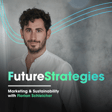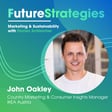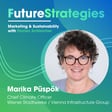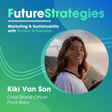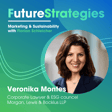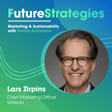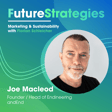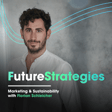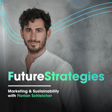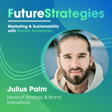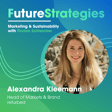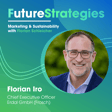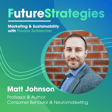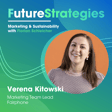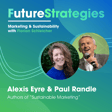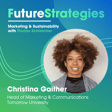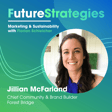Are today's children more sustainable?
00:00:00
Speaker
the generation of my kids in terms of green sustainability, thinking, future, being cautious, not overspending, not being totally consumistic, I'm confident they're better than we are. And steel is human. We tend to favor our convenience before the convenience of the planet. And that's where I say that we have to be very careful.
What is 'Future Strategies'?
00:00:26
Speaker
to Future Strategies. I'm your host, Florian Schleicher. And this show is my gift to you. In honest conversations with inspiring marketing leaders, we explore how marketing and strategies can achieve sustainable growth.
00:00:44
Speaker
If you would like to apply this to your own projects, that's exactly what I do as a strategist, coach and workshop facilitator. I'm here to help you build the marketing of your futures. So let's jump right into it.
Who is Maurizio Polito?
00:01:04
Speaker
So today I'm talking with Maurizio Polito. Being a designer and entrepreneur by practice, grown into a banking executive, Maurizio is driving to transform the banking industry from the inside. He is the founder of AstaGroups in-house fintech, and for over 10 years, he has been driving force behind the development of George, whose more than 9 million users across Austria and Central Eastern Europe make the region's leading banking platform.
00:01:33
Speaker
In January 2021, Maurizio joined the ranks of the Esta Group Management Board as the first ever Chief Platform Officer.
How is Maurizio transforming banking?
00:01:42
Speaker
The main tasks keep him busy these days on how to enhance, organize, scale and govern digital banking to improve the financial lives of as many people as possible.
00:01:54
Speaker
I am so happy to have you with me here today. So welcome to the show, Maurizio. Thank you for having me, Florian. Looking forward. So the reason why I'm particularly happy that you are here now is because our relationship actually started with a disagreement. So we have met at the panel discussion and we were talking about strategy and sustainability.
00:02:18
Speaker
still remember that we agreed to disagree. And immediately afterwards, I was thinking, gosh, probably he'll never want to talk to me again. But then I reached out to you and you said, yes, of course, let's do this. So thanks for being here and engaging in the discussion today. I'm looking forward to change my mind.
Creating the George App: Innovation in Banking
00:02:36
Speaker
So I would like to talk with you about two topics. The first, strategy and innovation around the charge app. And then second, sustainability and how it can be implemented on a strategic level.
00:02:48
Speaker
Let's start with innovation. Usually, innovation comes from market outsiders and the big companies lag behind, but you were part of the George App creation, a banking app for those who don't know it. That for me felt like a stepping stone into the future from a corporate bank. When I first opened it, and I still love it,
00:03:11
Speaker
And I saw that many tried to copy it. What role did you think strategy played in that whole product creation process? Very interesting. Look, normally a strategy rely on the fact that you have a target. And when we started to do what we have done for the bank, we didn't really have a target.
00:03:31
Speaker
So what we were focusing on was not on the strategy, on a strategic approach, but rather we were focusing on to build a certain culture. And we were very confident that once we build a certain culture and we collect the right people that could fit on that culture, something good will come out.
00:03:50
Speaker
And out of that something good, you build the next thing and the next thing and the next thing. And then you start connect all those little things and those boxes. And then normally you can start seeing a strategy forming. Very often I had this idea that a strategy is someone on a room deciding, OK, we want to go that way. This is our goal. And we use this strategy to get there. Right. So you need to have clearly the target visible. Yeah.
00:04:16
Speaker
And I have to say, when we started to work for the bank, and it was not only me, there were several other people joining me in this venture. We started in 2012.
00:04:27
Speaker
we didn't really have a goal. And many executives from the bank were coming to us and telling us they were not asking strategy or goal, they were asking, what is the big picture? What is the vision? And for many years, we struggled to deliver that picture until we realized that there was no picture to draw. There was not something, you draw a picture and then you get all the resources going in that direction. But it was rather,
00:04:54
Speaker
having some beliefs and ideas or some some beliefs i will say and then start doing one step after the other one in the same direction and then once you start connecting the dots see what is working what is not working eliminated what is not working push for the what is working and then connecting the dots make this what you would not call the strategy visible never written in a piece of paper and i somehow find this very
00:05:24
Speaker
inspiring because I myself today don't ask people anymore. I'm not trying to understand if people have a goal or a target. I'm trying to really to understand if they have the right culture to go in the right direction. And there is this famous quote from Steve Jobs when he said, you can only connect the dots by looking backward and not by looking forward.
Understanding Strategy: Past Successes vs. Planning
00:05:43
Speaker
And that's pretty much what we have done. We have done lots of things that make sense to us. We have choose to do something and choose not to do something else.
00:05:53
Speaker
And then after a period of time, you can see that you can start connecting the dots and the things make some houses.
00:06:00
Speaker
So interesting. It reminds me of a quote from a friend of mine. He's the head of creative at Too Good to Go Global. And he said to me, creativity is about inventing a future that is not there yet. So it sounds like a very creative driven process. And it also reminds me of a book that I just read, The Innovator Solution, where the authors write that there are two ways to approach an innovative process. So one is deliberate planning, where decisions initiate a project that is grounded on numbers and rules that would be objectives.
00:06:30
Speaker
And then there's discovery driven planning where there are decisions that are based on pattern recognition more so it sounds like you did that with George at the beginning. Our project was built on curiosity and some strong convention we were very convinced that digital will.
00:06:50
Speaker
digital will will take over the banking industry pretty much in the same way as being talking over other industry as well. I mean, this is not a fantastic revelation for many of us today is very obvious. For many people at that time was very obvious, too. It's just, you know, the classical situation is you have a business that is already very successful. You tend to say, why do I need to risk something? Why do I need to experiment? I keep running the business. And so
00:07:20
Speaker
It requires a bit of at that time it got a bit of bonus from the management board of that bank at that time from the co to believe that few people not coming from this industry because as i said before we were focusing on the culture and question is what is culture culture is the people you bring on the table and the.
00:07:40
Speaker
the way you plan to get them to work and which kind of briefing you give them. And I think we had mainly not bankers on the table. So I think one of the reasons why our project had been successful is that
00:07:59
Speaker
have been built by people that are not bankers, but they are using banking every day and they have the capacity of understanding that I want to have the product in that quality.
00:08:11
Speaker
we actually build a product we would love to use, right? That's this was it was a very personal ambition. We all sit down and say, listen, what all the banks are offering today, anyone likes it here. And everyone said, No, we hate it. And can we do something that we all love? And under the idea that if we like it, and if we love it, most probably a lot of people there will like it and love it too.
00:08:36
Speaker
Yeah, so as I said, not big strategy, but very much put passion on this topic and especially being convinced that design, digital interfaces, customer experience can make a difference.
Design and User Experience in Banking
00:08:52
Speaker
So we had zero cynicism on the idea that, well, banking is profitable anyway, and it doesn't matter if your app is good or bad, the banks would make money anyway. We really, truly believe, and also probably in an exaggerated and naive way, that we truly believe that if we don't make this right, the whole world will collapse, which of course is not true.
00:09:15
Speaker
But we put so much passion and effort on it that we want to do something we can be proud of. And I think partially we manage somehow.
00:09:26
Speaker
Yeah, definitely. And I think what you mentioned is very important that you had the commitment of the CEO because otherwise such a big innovation project would probably not be possible and feasible. And you had some like pillars that guided you, like you mentioned, it has to be personal and probably also something like it has to be easy and convenient. How did you figure out what the customer's needs were? Did you just go in with your own assumptions or did you also do customer research for that?
00:09:55
Speaker
Now, yeah, well, very good point. Yeah, of course, we did a bit of customer search, a bit of focus group, but rather to validate if our gut feeling were right or wrong. From the initial phase, we were really relying on what we would love to use ourselves. And still today, you see, I'm meeting every new employees in the team every time a new employee. So I met 10 of them this week.
00:10:24
Speaker
I do an introductory, I tell them the story of this project, and I try to tell them the vision and what we believe in and the direction we are going. And I always encourage them to say, listen, the organization we're built here in the bank is a very flattish organization. We are all available at almost in a real-time chat mode. Everyone can select me, anything.
00:10:49
Speaker
And I said, look, I'm interested in your opinion. Also, of course, a professional opinion, but you are a front-end engineers. We will not have a JavaScript discussion, but I'm also interested, or I'm mainly interesting on your opinion as a reader consumer. You know, tell me if there is a function in George that you don't like it. Tell me if there is a feature where you would love to have it because you or your family would use it. That's exactly what I need. Right. That's how this project started. So we said.
00:11:18
Speaker
I think I remember at that time, the assumption was we said, look, most of our customers are using those global platforms. They're using Facebook, they're using Airbnb, they're using Gmail. And we ask ourselves why the banking platform should be much different from all those things, right? So can we do a banking platform that is a pair at least, or it gives the same good customer experience, like I have it in Airbnb or I have it in
00:11:46
Speaker
in Gmail, right? And I think this is how everything started. Then, of course, we use focus group and user test, but rather to validate if our assumption were right or wrong, instead of just using user research to figure out to go left or right, or to do it blue or green. I don't really believe in that level of user research. I think
00:12:09
Speaker
We designer, we creative people, we business people, we have the responsibility to come up with ideas and solutions. This is our job. It's not the customer job. It's our job. And we need to take the risk of believing in something. And then of course we use user tests and focus groups and customer survey to validate if we are right or wrong.
00:12:32
Speaker
And it makes total sense because whenever I do a strategy workshop or an innovation workshop with a client, I always like to come back to the quote from Henry Ford, which was, if I would have asked people what they wanted, they would have told me faster horses. So customers can of course tell you how they feel, how they perceive things, but real innovation is out of sight from customers because as we discussed, it's something in the future that nobody has seen so far.
00:13:00
Speaker
Correct. Yeah. And, you know, of course, in our case, we are having a mass market product here. We're having a product that is used. We are building a platform that is not very focused on a specific segment, right? Yeah. We're having a platform that is used by people at 10 years old to 99 years old, 100 years old, right? There are a whole spectrum. There are in that platform, in George, we manage super rich people, normal people.
00:13:26
Speaker
struggling people, young people, old people. There is the whole world in there, right? We are a mass market bank in many countries where we operate, somewhere we are more affluent or less affluent, but in general, we are a universal bank, right?
00:13:42
Speaker
And therefore, it's also very hard to find the customer voice because we don't have a customer. We have many customers, right? We have many different types of customers. And the other complexity is we do a platform that is operating at the moment in six different countries, six different cultures, attitudes,
00:14:04
Speaker
Attitude towards for instance investment at a different attitude towards savings different attitude towards digital so also there is very variegated is very diverse and.
00:14:17
Speaker
And therefore, it's even more important that we have few principles we trust. One of our leadership principles within the team is a principle that talks about the fact that our leadership has to be able to take the risk of making decisions, and we encourage our leadership
00:14:36
Speaker
to take decision with your guts. So really, I want to see strong beliefs in your guts. However, the exercise is to make sure that your guts are educated. Our job is to educate our guts in order to make decisions with my guts. And I think that's exactly what we encourage all our leadership to do, right? We want people taking risks. We want people having strong opinion.
00:15:00
Speaker
We want people having emotional decisions. We like this. I do this myself, but I'm expecting this from our team as well. However, our job is to constantly educate our guards to make sure that we are not completely out of reality.
00:15:18
Speaker
Yeah. You mentioned one word in what you were saying is passion. And I watched a behind the scenes video from the George creation process. And one colleague of yours said you were the one with the ideas, the vision, the stamina, and the Italian passion to fight for them. So I wanted to ask you what role does passion play in strategy? Doing a project like this in a big organization is a
00:15:44
Speaker
Or in general, George is a transformational project, right? We are taking an organization which is very solely sitting on an existing operating and business model, and we try to introduce a different way to
00:15:58
Speaker
serve our customer to transform the organization. Now, no one likes to change. Customers don't like to change, employees even worse. We all don't like to change. We tend to repeat the same thing over and over again, and we feel very familiar in doing the same thing over and over again. Normally, you need to have very good reason to change. Very often,
00:16:24
Speaker
People get to the point that they are forced to change the things don't go very well or you're in trouble or you don't make money anymore. Therefore, change is a necessity just to survive. Now, if you.
00:16:37
Speaker
introduce a change program or a strong change project within a large organization, you will actually find very good people with very good reason why it makes no sense, why it's not worth it, why it's not the right time, why the question, the transformation, and so on. Probably they don't really know this, but they are just hesitant because it's change.
00:17:03
Speaker
Exactly. They're not bad per se. It's just that they say, listen, we have done a good job and why do we need to risk it? Can we just optimize it? And so on and so on. And so in order to get those projects really
00:17:19
Speaker
performing, so pulling the challenge off, you need to be very persistent.
Is passion key to transformation?
00:17:24
Speaker
You need to have a stamina. Now, the reason why they call my stamina, they call it emotional or it's because I tend to be loud and, you know, I'm coming from a Southern European culture, so I tend to be loud and be very outspoken. So I could escalate, but then one minute later, I have no problem at all. So I don't take things very personal and so on.
00:17:46
Speaker
which is probably different than what a German or a Northern European would do, right? Look, what we do is really hard. Transformation is really hard. So either you like it and you enjoy or you will give up. And I think that's the whole thing, right? We don't give up. And of course,
00:18:05
Speaker
is not only about us one of the factor that allows you not to give up is that you feel around yourself support from the right people that's where back to the management support now and then i'm in the man's position i'm trying to basically act with my people with with with my team or with the band with with with.
00:18:27
Speaker
the bank organization, I try to act as the management I found in as the group act with me when I came in from the outside without any experience.
00:18:36
Speaker
So it's all about passing on what you experienced when you first joined for the next generation. So let's dive into change a little more, because also you mentioned that one big part of the charge creation was what problems do people currently have? What do they want to change about banking? And currently a lot of people are talking about sustainability.
00:19:00
Speaker
And back in my talk last autumn, I argued that companies would need to not just focus on profit, but also bringing people and the planet and its resources into balance. And I had this graph shown with three circles, each equally big. And then in the middle, there was an overlap and I said, we need to go to that overlap. And you said, if I remember correctly and please correct me if I'm wrong, that people will always focus on profit.
00:19:30
Speaker
First, and if that's a given, then they will maybe choose something good. What I see right now is that if you ask people, and I'm here, I'm not talking about early minority or early believers, I'm talking about
00:19:46
Speaker
our society, mass market, our society. If you ask them, do you think that we should improve our carbon footprint or our sustainability ratio and whatever, they all say yes. If you put this at the discount of any convenience on their side, then they struggle. If I say, listen,
00:20:08
Speaker
Would you give up your car and start going to holiday three times a year with the train rather than taking your car and going there? And then, and then only a minority will be able to be so bold to do this, to do this switch. And the other will probably prioritize convenience versus a belief.
00:20:31
Speaker
And I'm not saying this to describe that we are living in a bad society. I don't know if I mentioned when we mentioned last time, but I strongly believe that the generation of my kids, I have two kids, 18 and 13, I believe that the generation of my kids are a much better generation than my generation. I'm 50. I grew up in the eighties. I think people who grew up in the 17, the eighties, they are the worst generation ever.
00:21:00
Speaker
We are the worst parents ever. The people in my age, remember the 80s. The 80s was about growing, right? Who cares? It was about taking over the, we care about nothing, right? It was, remember 80s was the, at least in Italy where I grew up, 80 was the beginning of private television, advertising, consumption, consumption, consumption. It was about the explosion in our part of the world of consumerism, right? That's what was the 80s. We grew up
00:21:28
Speaker
was born in the 70s, I grew up in the 80s, we grew up in a period where there were no wars around, no wars, no crisis. Yes, more little crisis left and right, but small stuff, right. We have been always better off that our parents and grandparents, you see, the lucky we're the lucky shot. And this has impacted our character, our kids,
00:21:52
Speaker
have been going through a hard time. Maybe the generation of my kids is probably the first generation who will not be as wealthy as their parents. So the curve is turning around. They have seen war. They have seen pandemic. They have seen problem. Yes, they have a lot of opportunity. They have internet. Their access to knowledge is better than anyone else. They speak languages that at their age I wasn't even dreaming of speaking languages, right? And so what I wanted to say is that
00:22:21
Speaker
They, the generation of my kids, in terms of green sustainability, thinking future, being cautious, not overspending, not being totally consumistic, I'm confident they're better than we are.
The Environmental Concerns of Younger Generations
00:22:41
Speaker
And steel is human. We tend to, I think we all tend to favor convenience before
00:22:51
Speaker
our convenience before the convenience of the planet. I make something banal right now. And that's where I say that we have to be very careful. And so we need success story.
00:23:02
Speaker
to make transformation happen. So for instance, back to my business, one of the tactics, not the strategies, the tactics, one of the tactics we use to make change in a big organization in Esther Group is to do small projects, to roll them out. So not to tell people what to do, but to do a project ourselves, roll them out, make them successful, and then heavily, heavily celebrate those projects.
00:23:26
Speaker
really try to sell the success. Why? Because large organization, especially big company, like our bank is and was, is a big company, large organization are shifted by success story.
00:23:41
Speaker
They're not shifted by PowerPoint. You don't send around the PowerPoint and from tomorrow on, everyone is doing what's written in the PowerPoint. But if you start having a little project that has success, that it has management attention, that management talks about it, and then you see that the people who run that project start having a career, then everyone around is start making the math and say, okay, look at this. They did this little transformation. It works.
Driving Change in Large Organizations
00:24:07
Speaker
Management talk to them.
00:24:08
Speaker
they're happy about that they communicate that media attention that management the patient that carries and then everyone and i don't care if they do it because they believe in it or they do because they have an ambition in their career but they do it that's the most important thing they're doing it. So i think in green transformation we need something similar we need success success story somehow look i give you an example i believe tesla goes a bit in this direction.
00:24:34
Speaker
Absolutely, I agree. A bit, not fully, but a bit in this direction. This is a success story. The owner is Elon Musk, is the richest person in the world. They've been ahead of anyone else. Yeah, they do a car. A person doesn't even like the design of that car. I don't think it's the most beautiful design car ever.
00:24:55
Speaker
But there is a success story around it. And I know I was reading a couple of maybe last last year, I was reading that the reason you ask this trading app for people for young people called Robin Hood. It's an app you download to buy and sell shares mainly. And the most traded share is Tesla share. And trust me, this is not because people believe in the green transformation of Tesla is simply they want to buy a piece of that success story.
00:25:23
Speaker
Got it, yeah. We care. No, as long as they start the transition, I don't care, right? As long as things happen. So I think we need to be the green transformation, in my view, of the green awareness and our societal behavior transformation needs to be strongly bounded and very tactically bounded to success story because people tend to follow success story.
00:25:47
Speaker
So I totally agree on what you said on the mass market that people, older generations, especially don't care that much. They grew up with a paradigm of endless growth and the world is ours. Everything's up for grab. And we also see that the younger generation, for example, 62% of channels had say they prefer to buy from sustainable brands. And some also say they will forego.
00:26:12
Speaker
some financial benefits for it. I've read a report where they accept the price premium of 40% if something is sustainable. And I also agree with you that
00:26:26
Speaker
A lot of this change needs to come from organizations because they can, if Tesla says, okay, and they are not perfect by any means, but what they do is they shift how people think. And in doing that, they push people to a more sustainable behavior because we all agree.
00:26:47
Speaker
An electronic vehicle is more sustainable in a lifetime value analysis than an oil-based car. But doesn't that mean that companies need to have a stronger stance on sustainability? And I also have an example from last year, which was maybe you've seen the Apple TV ad about sustainability with Octavia Spencer, where she enters a room full of Apple executives. Tim Cook is there and she says, okay,
00:27:16
Speaker
Let's hear it where you are at. And what follows is a very authentic, entertaining approach from Apple where they say what they are doing and also where they are not there where they want to be, but they go out with some pretty big commitments.
Apple's Sustainability Campaign
00:27:31
Speaker
And what I liked about this, and again, Apple is also not perfect, but what I liked about it, it was a very authentic approach. It was brave.
00:27:38
Speaker
And it also showed to a mass market, hey, we're going in a more sustainable direction. We'll take you with us because the customer then just buys a product. And if it is more sustainable, perfect. I worked, for example, at Too Good to Go.
00:27:53
Speaker
And we were saving food leftovers and we didn't care why people saved food. It was just, okay, if they save food with the app, whether it's because they save money or they try to do something new or they want to do something sustainable, it doesn't care because it's good. But then, and this is now.
00:28:13
Speaker
my criticism because I also looked at your ESG page from Erstebank and you're not responsible for that, I know, but it feels a little bit empty. So my feeling was that whereas Erstebank did a great job in innovation with an app and the future of finance out there, and maybe there are the projects and you're not yet talking about it, but there is so much on social and governmental and not so much on the environment part of ESG.
Erste Bank's ESG and Social Initiatives
00:28:43
Speaker
in your opinion, should Este also be a front runner and an innovator, like it is in many other things in sustainability? Well, look, there are different dimensions in ESG, right? So let's talk about the social one. I mean, we are one of the few banks in Europe and in the world probably that have a charity foundation as a main shareholder. So
00:29:08
Speaker
Every profit we generate from the commercial bank, it goes into the percentage share of the foundation and the foundation is a very clear target.
00:29:18
Speaker
We do two things in the foundation mainly. And again, so basically we are trying to have the development of civil society in the country where we operate. Now to you, me and you living in Austria, coming from Italy, civil society is a very well-known concept. But if you go to a country like Romania,
00:29:40
Speaker
or Slovakia or Hungary. It's a rather fresh new concept, right? We found in the past that even the world is not translatable, right? They don't even have words to describe civil society. And so part of the effort that our colleagues at the foundation are doing is to support NGO and support
00:30:02
Speaker
initiative in all those and all the country where we operate to foster and to allow and even give visibility to initiative that goes in the direction of developing a civil society. Now, many people don't build that connection between the Esther Foundation and the bank, but that's actually a very unique machine we put together. And in case, I mean, just in general,
00:30:24
Speaker
our foundation is not a charity foundation under the bank is all of the bank so they own the bank so they are technically there my boss they are giving us guidance they're giving us direction what to do and what to do so that is one role.
00:30:40
Speaker
The other of the foundation is to support basically access to banking so you have to understand that banking became over the last fifty years and necessary commodity to be able to leave your life if you don't have a bank account you must probably you will not be able to rent an apartment you probably will not be able to
00:31:03
Speaker
make a contract with the electricity company, you need to have a bank account. So a bank account is a commodity. Now, having a little credit is a necessary thing to survive, right? Now, there are people in our society that for whatever reason, because they have trouble, they went bankrupt, or maybe they don't never really access it. They just don't have access to those services. That's the other job of the foundation. The foundation is trying to basically
00:31:29
Speaker
offer banking services to people which are not bank yet to bring them to a level that they can afford a commercial bank like us and so you see here the symbiosis between the work they do and the work we do in the bank they are preparing the ground for these people to come into commercial banking we have an initiative.
00:31:50
Speaker
I think it's 10 years old that, unfortunately, we didn't even talk enough. And I think I would never stop telling. I don't know, lots of people knows that we have founded a new bank in Austria. It's called Zweite Spakasse. So we are Este, the first Zweite Spakasse, the first Zweite Spakasse. And 10 years, I think it was 10 years ago, maybe around 10 years ago, we founded something which was called Zweite Spakasse. In the same location in the second district,
00:32:17
Speaker
where we actually, our original bank was founded almost two years ago, 200 years ago. So, Zweite Spakasse has one role. They are responsible to give people a second chance, especially people who went bankrupt or that financial problem or they went to jail. Normally, these people come out of jail and they simply don't get access to banking services. Yeah, which creates a vicious cycle. Exactly. And so, that's the job of Zweite Spakasse, which is a bank we built with
00:32:46
Speaker
with volunteers, mainly we're using bank pensionists, and a couple of NGO around it, especially the one related to debt counseling and all this stuff, to select the right people, give them banking product for free, help them to get into their feet again. And when they're ready, they're going to pass it up to the normal regular bank, and they will become regular businesses. So this is what we do on the social side.
00:33:11
Speaker
maybe you're right that we don't communicate this very much. We unfortunately, or fortunately, we tend to add in the we tend to have already still today. And also in the past, a bit of reservation is making all our initiative too prominent, because we never like those company who actually they're over talking about their social initiative, we were very
00:33:37
Speaker
So we had very strong communication in the community so the community and the NGO community knows the Esther Foundation very well. But we never really did communication for everyone else just because we didn't want it to cross too much. But this is strongly part of our G part. In the part of ESG here comes a tricky part in a sense that there have been attempts in the past
00:34:00
Speaker
to believe that the role of the bank is to force company to become green by simply doing what? By simply not giving them money to say, OK, stop financing those industry and they will and they will and they will and they will be forced because they have no money. They will be forced to transform. You see,
00:34:20
Speaker
I had the impression in the past that politicians thought that this would be an easy way to get those companies to transform by taking from the money point of view and financing point of view, rather than saying we probably need public policy to make that transformation happen. And you see, our job is to have those companies, these are companies that are totally aware, we're not financing any new things which are not green, but
00:34:44
Speaker
We have company where we have relationship for decades and we have been helping them to grow where they are right now. And we also feel the responsibility if they are in a transition period to finance that transition. And sometimes I had the impression that, you know, movement groups and believe, oh, you finance that company and this is a brown company. And they say, yes, but if we will not finance it, they will never transform.
00:35:09
Speaker
because the state doesn't give them money, right? So it's our job to happen to transform.
How should banks support green transitions?
00:35:14
Speaker
So at the moment, that's where we are in right now. We are helping those companies to transform, and we are helping them with the tools we have in our hand, which means financing and so on. And of course, we try to explain that this is necessary. So we are not taking in any new project unless they guarantee us that this is green or is properly documented.
00:35:38
Speaker
the big question is not about the new the new finance in the big question is the big question is the transformation of the existing business and there i have to say we see ourselves as a partner for those company and i think it would be it's good that we are partners and.
00:35:57
Speaker
We have been committing on those topics and we will continue to work hard on those topics. So I totally agree on what you're doing on the governmental side and the social side, that you have a big impact with the Foundation. But I think in terms of communication, and you mentioned that,
00:36:15
Speaker
It seems like you're doing things, you're trying to get the industry through finance to become more green, but there's not that much communication about it. And I'm just questioning whether if you would do more communication on that side, it would signal to companies, to other financial institutions that, okay, like Apple did, okay, this is the way we're going to. And that's not like the focus of the year for us, but it's just like,
00:36:42
Speaker
We will be doing our fair share here and that's on a communicative set. Yeah, I see your point. What I would recommend you also to consider is that, and probably we have to even improve our communication in this direction. What I would suggest you to consider also the fact that we tend to leave, now we talk about communication, we tend to leave in a polarizing world.
00:37:11
Speaker
means is 100% green, which is 100% great, or is 100% black and is 100% black. We need to move away from black and white because... I know, but that's the reality out there. That's social media, right? That's... Then the risk is you do communication and you try to explain your argument and your approach.
00:37:30
Speaker
And then you're going to be and then there is a chance. I'm not saying this will happen, but there is a chance. And you know what I'm talking about, that actually someone will pick up that little leaders and turn it into, oh, you see, you are polluting the world. Right. Not understanding that we are the whole world at the moment is in a transition phase. I agree with you that at the moment, what we see right now globally, let's let's
00:37:57
Speaker
Let's walk back a bit and give a bigger perspective. So what I see globally is that Europe, which is actually polluting relatively nothing compared to the rest of the world, is taking this rather serious, even from a formal point of view. We are talking about regulation on banks. We are talking about regulation on cars. We are talking about really regulation, right? So we are taking really this serious.
00:38:21
Speaker
I don't think the American are taking this serious or at least I don't believe that if Trump win win the election, they will really double down on that topic. I know that China is start, but they are on the China and India. They're on a face that let us let us make the party. You did a party years ago. We want to do the party as well. Right. And there is this little continent, Europe in between, which actually, if we would become
00:38:50
Speaker
green tomorrow, I would love it and I believe and it would give me the feeling that we are the best place to live in the world, which I believe today. We are the best place to live in the world. Europe is the best place to live. I'm a cultural, from the quality of life, from the social support, we are the best place. But still, if we're going to get all green tomorrow, we are most probably not solving the problem of the world.
00:39:12
Speaker
Which doesn't mean we shouldn't do it. We are part of this, but we are too small for that. And so that's the situation. So we are in this gigantic transition phase at the moment. And I believe that our public opinion needs to understand that we are in this transition. And like in every transition phase, you cannot be black and white. You cannot be polarizing. That's what I wanted to say. Yeah. And I think that
00:39:41
Speaker
It was a great point, also the risk of when you communicate sustainability, you open door for a backlash.
Communicating Sustainability Effectively
00:39:47
Speaker
If you're not white and then you're just black, I think in a broader conversation, we need to move away from those terms in sustainability because I think they won't get us anywhere. I also think that Europe will not solve the problem, but they can play a big part in signaling to other countries because if we as a super rich continent can't do it,
00:40:09
Speaker
Then other continents would say, yeah, but you're not even doing it. I agree with you on this. I agree with you. I like, I like what you said. And I think it would be nice to say, okay, we can show that it's possible. We can show that.
00:40:22
Speaker
You know, we are the part of the world which has probably the biggest heritage and the biggest cultural condensation. So if we prove that it's possible and if it prove that we believe in it, the other will believe it too. I'm not quite sure that is so obvious, though there is so one on one, right? That's I'm not sure. I don't think we are so influential. That's what I wanted to say. The risk I see here is that they like it, that we do it because they have opportunity to make more business.
00:40:51
Speaker
Yes, that brings a very valid point to the discussion also. Maurizio,
What did we learn from Maurizio?
00:40:56
Speaker
I think I've got a very much better understanding of where you are with your positions and I have learned a lot, obviously, of this and I already can see that there is lots of room for another discussion between the two of us. I want to close this interview with the three final questions.
00:41:18
Speaker
Okay, cool. Let's go. First question is, what is a good strategy for you in three words? A good strategy is a call to action. Call to action. Three words, yeah. What do you think is the future of strategy and sustainability?
00:41:34
Speaker
tactics and success story, as I said before. I think success stories will play a huge role in the transition. And finally, a more personal question. Is there any book that you've recently read that you would like to recommend here today?
00:41:51
Speaker
Look, the last really the last the last book I would I could I was reading that I could recommend. It's a book about it's a it's a leadership book and it was written about one. It's a U.S. story, of course. And it's it's it's called Trillion Dollar Coach. It's about it's about Bill Campbell. And he is an executive. He was a American football coach in the U.S. and had been in the board of a lots of tech company.
00:42:18
Speaker
without being an engineer. So he was person people. He was very good in dealing with board context and board situation and conflict and so on. And I liked his story and his character very much because he's very direct, very passionate, extremely
00:42:41
Speaker
always over enthusiastic, it is on the positive side, right? And I think I see too many people around that always are very smart in finding reason why something doesn't work. And I think we need more leadership and more entrepreneurs who actually
00:42:59
Speaker
rather than looking why something will not work, try to think about why something will work and change. So that optimism is something that we definitely need more in our part of the world. And I enjoyed that book, and I would recommend it to anyone who would want to be a good leader.
00:43:16
Speaker
Thanks. That's such a nice way to finish also the conversation with optimism at the end. Maurizio, thank
Closing and Invitation to Marketing Academy
00:43:22
Speaker
you so much for coming on the show. I know you have a busy schedule, so I appreciate you taking time speaking with me. You're welcome. And I look forward to next time we see each other. Thank you.
00:43:34
Speaker
That's it for today. Thank you so much for listening. If you have enjoyed this episode, please give me a rating and a review. This means the world to me, as I really pour my heart into the production and the interviews with those brilliant minds. If you are looking for an easy way to learn strategic marketing, check out the Simple and Sustainable Marketing Academy, where I share the basics of strategic and sustainable marketing in an online life setting.
00:44:03
Speaker
You can also sign up to my inspiring newsletter, where I deliver valuable thoughts to your inbox on how to achieve sustainable growth. I promise you will like it. And if you want to get in touch and find out more about me and my projects, just have a look at the links in the show notes or find me on Instagram and LinkedIn at Florian Schleicher. Thank you so much for listening and I look forward to sharing more with you in the next episode.

